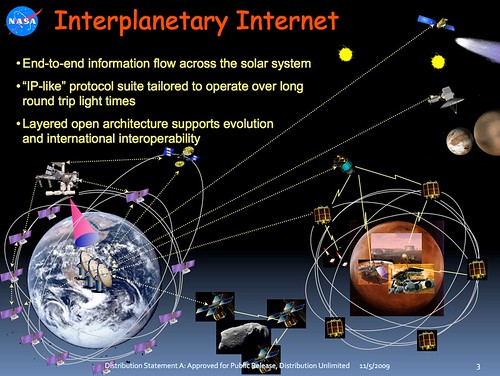It's Networking. In Space! Or How E.T. Will Phone Home.
What will the version of the Internet that follows us to the stars look like? Yes, people are really thinking seriously about this sort of thing. Specifically the InterPlanetary Networking Special Interest Group (IPNSIG).

Ansible-like faster-than-light communication it isn't. There's no magical warp drive. Nor is a network of telepaths acting as a 'verse spanning telegraph system.
It's more mundane than that. And in many ways more interesting as it's sort of like the old Internet on steroids, the one that was based on on UUCP and dial-up connections, but over vastly longer distances and with much longer delays:
The Interplanetary Internet (based on IPN, also called InterPlaNet) is a conceived computer network in space, consisting of a set of network nodes which can communicate with each other.[1][2] Communication would be greatly delayed by the great interplanetary distances, so the IPN needs a new set of protocols and technology that are tolerant to large delays and errors.[2] While the Internet as it is known today tends to be a busy network of networks with high traffic, negligible delay and errors, and a wired backbone, the Interplanetary Internet is a store and forward network of internets that is often disconnected, has a wireless backbone fraught with error-prone links and delays ranging from tens of minutes to even hours, even when there is a connection.[3]
And this is not a goal for the far future, it's barely a moment away as IPNSIG spells out in their delightful BHAG:
The mission of the InterPlanetary Networking Special Interest Group (IPNSIG) is to realize a functional and scalable system of interplanetary data communications before the year 2020.
Delay Tolerant Networks will have some fun implications.
A low latency assumption is baked into nearly every software system now built. Violating the low latency assumption changes everything.
Any system that assumes an equality of information, a classic tenant of a market economy, is hackable.
Software architectures will have to adapt to delay tolerance and even exploit it for beneficial effects. What does Twitter or Snapchat look like over DTNs? How do you handle payments? Or contracts? Or proof of work? Even eventual consistency seems impotent on a DTN.
A positive effect is that we may again see an evolution of independent cultures. Worlds will be distant enough that an omnipresent popular culture may not be able to synchronize everyone into a bland sameness. Then again enforcing a global human invariant like anti-slavery laws will also be much harder to enforce. Will we see divergence in proportion to the distance from the core worlds? It's easy to imagine a song or movie becoming popular on the Mars but not on Earth because of social network effects. These kinds of effects will be interesting to see.
The private wire opportunities are intriguing. Build a faster alternate Internet that can send information to worlds faster than the general public and it's possible to leverage that information in many ways. Through their network the Rothschild's were able to learn of Wellington's victory at the Battle of Waterloo a full day ahead of the government's official messengers and spun this information to great profit. Imagine what you can do between worlds?
Security is a nightmare because each hop in the network is a monitorable choke point. And there probably won't be a lot of alternative carriers.
Learn more with these far out resources:
- The History & Future of IPN, a key enabling space technology innovation by Vint Cerf
- Delay- and Disruption-Tolerant Networks (DTNs)
- Space Technology Innovations Conference - Jan 24 2014
- Delay/Disruption Tolerant Networking - This talk will present an overview of Delay/Disruption Tolerant Networking (DTN)
- The Ring Road: CubeSats + DTN by Scott Burleigh, DTN Architect
It's good people are thinking about all of this now, because there's no money in it...yet. Once money enters the picture walled gardens will rocket up and we may never see another standard.
Let's hope they do a good job. It has to last until the Aliens finally make contact and uplift us to Internet Infinity.0.




